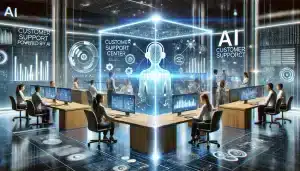As customer expectations continue to evolve, businesses must stay ahead of the curve to meet their demands. One of the most effective ways to do so is by integrating Artificial Intelligence (AI) into self-service solutions. AI has revolutionized customer service by offering intelligent, proactive tools that enable customers to find answers and resolve issues independently, thereby enhancing their experience. This evolution of self-service platforms not only reduces dependence on support teams but also provides faster and more efficient service, ultimately boosting customer satisfaction.
The Role of AI in Self-Service Solutions
AI plays a pivotal role in modernizing self-service platforms by providing dynamic and intuitive solutions that help customers solve problems on their own. Unlike traditional static FAQs or knowledge bases, AI-driven self-service tools are powered by Natural Language Processing (NLP), machine learning, and AI algorithms, making them more context-aware and interactive.
- AI-Powered Chatbots: One of the most widely used AI tools in self-service, chatbots interact with customers in real-time, answering questions, guiding users through troubleshooting, and providing relevant information. They are programmed to understand and respond to customer inquiries based on natural language, offering a conversational experience similar to speaking with a human representative.
- Virtual Assistants: These intelligent assistants go beyond simple question answering. They can manage tasks like appointment scheduling, order tracking, and providing personalized product recommendations. By using AI to understand context and customer behavior, virtual assistants can provide a seamless experience that feels both automated and personal.
- Interactive Knowledge Bases: Traditional knowledge bases are static and require customers to manually search for answers. In contrast, AI-driven knowledge bases provide more tailored solutions, using data to suggest articles and answers based on the customer’s question and profile, making it easier for users to find what they need quickly.
- Tools such as AI-powered chatbots, virtual assistants, and interactive knowledge bases use natural language processing (NLP) to understand and respond to customer inquiries.
Personalized Support Through AI
Personalization is at the core of the value that AI brings to self-service solutions. By analyzing a customer’s past interactions, browsing history, purchase behavior, and preferences, AI can offer tailored support that feels uniquely relevant to each user.
- Tailored Responses: For instance, if a customer is troubleshooting a product, an AI-powered chatbot can suggest solutions based on that customer’s specific product usage history. By examining previous conversations, the AI can propose the most effective troubleshooting steps, reducing frustration and ensuring that customers receive the most relevant support.
- Proactive Recommendations: AI’s ability to analyze vast amounts of data allows it to provide proactive assistance. For example, if a customer is browsing a website and appears stuck, AI can detect these patterns and proactively suggest the right solutions or resources, such as guides, FAQs, or tutorials, preventing potential issues from escalating.
By offering personalized, context-aware interactions, AI enhances the customer experience, ensuring that individuals feel understood and well-supported throughout their journey with a brand.

Empowering Customers with Proactive Assistance
Proactive customer service is a game-changer in AI-powered self-service tools. Instead of waiting for customers to reach out with a problem or question, AI can anticipate their needs and offer solutions before they even ask.
- Behavioral Monitoring: AI can track user behavior on websites, apps, or social media platforms, detecting signs of confusion or frustration. If the AI system recognizes a customer is struggling to find a product, check out, or navigate through a service, it can automatically offer help, whether through a pop-up chat window or by suggesting FAQs and guides tailored to the customer’s behavior.
- Personalized Alerts: For example, if a customer has an abandoned cart, AI can automatically trigger personalized reminders or suggestions via email or push notifications. This not only encourages customers to complete their purchases but also builds a proactive relationship where the brand anticipates and addresses needs promptly.
This proactive approach to support helps resolve issues quickly, prevents frustration, and improves the overall customer experience.
Benefits of AI-Driven Self-Service
Integrating AI into self-service platforms offers numerous benefits for both customers and businesses. These advantages extend beyond just automation and can drastically improve the quality of customer service and business operations.
- Efficiency: AI reduces the time customers spend searching for information or waiting for a response. With 24/7 availability, customers can resolve issues at their convenience, without having to wait for business hours. This quick response time improves customer satisfaction and decreases the load on human agents.
- 24/7 Availability: AI-powered self-service tools are always available, ensuring that customers can get help at any time of the day or night. This around-the-clock support makes AI a crucial asset for businesses that want to provide global service, especially for customers in different time zones.
- Cost Savings: By automating repetitive tasks, AI reduces the need for large customer support teams. Businesses can cut operational costs while maintaining high-quality service. Additionally, AI tools help lower the risk of human error, ensuring that customers always receive accurate and reliable information.
- Improved Customer Experience: The combination of personalization, efficiency, and proactive support leads to an enhanced overall experience. Customers enjoy smoother interactions, faster resolutions, and more tailored solutions, all of which increase loyalty and drive long-term satisfaction.
- Scalability: AI-powered solutions scale seamlessly as the business grows. Whether the company is handling ten customer queries a day or ten thousand, AI tools can easily manage an increased volume of interactions without compromising the quality of service.
Challenges and Considerations in AI-Powered Self-Service
While the benefits of AI-driven self-service are undeniable, businesses must carefully consider certain challenges to ensure that these tools deliver the desired results.
- User Adoption: Not all customers are comfortable interacting with AI. Some may feel frustrated if they are unable to get the answers they need from automated tools, especially if the system cannot handle more complex issues. Providing clear escalation options to human support is crucial for maintaining a positive customer experience.
- Data Quality and Privacy: AI systems rely on vast amounts of data to function effectively. Ensuring that the data used is accurate and up-to-date is essential. Additionally, businesses must prioritize customer privacy and security by complying with data protection regulations, ensuring that sensitive information is handled securely.
- Customization and Flexibility: AI tools must be customized to fit the unique needs of each business. A one-size-fits-all solution may not work for every industry or company. Businesses must ensure that the AI systems they implement are adaptable to their specific requirements and that they continuously improve the system’s accuracy based on user feedback.
Conclusion
AI-powered self-service solutions are changing the way businesses interact with customers. Through personalization, proactive support, and intelligent automation, these tools allow businesses to deliver faster, more efficient service at scale, while also improving the customer experience. By leveraging AI, companies can create a seamless, 24/7 support ecosystem that is cost-effective, scalable, and highly effective.
As AI technology continues to advance, its role in self-service will only expand. Businesses that adopt AI-powered self-service solutions will be better positioned to meet the ever-evolving demands of their customers, providing efficient, personalized, and seamless support experiences. By doing so, companies can enhance customer satisfaction, increase loyalty, and reduce operational costs, ultimately gaining a competitive advantage in the marketplace.
FAQs
- What is AI in self-service?
AI in self-service refers to the use of artificial intelligence tools, like chatbots, virtual assistants, and knowledge bases, to help customers solve their issues independently. These AI tools can analyze data, understand customer queries, and provide personalized, real-time assistance without the need for human intervention. - How does AI improve customer self-service?
AI improves customer self-service by offering fast, personalized, and context-aware solutions. AI-driven tools, such as chatbots, guide users through troubleshooting steps, provide answers to common questions, and offer suggestions based on previous interactions, which enhances the user experience and reduces reliance on human agents. - What are the benefits of using AI in self-service platforms?
The main benefits of using AI in self-service platforms include increased efficiency, 24/7 availability, reduced operational costs, and enhanced customer satisfaction. AI helps customers find answers quickly, providing them with personalized support and proactive assistance while minimizing the workload on human support teams.



